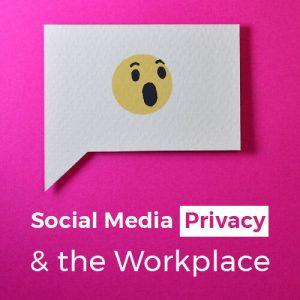
Social media is everywhere nowadays and that includes the workplace. It’s common sense to keep an eye on what you post on Facebook these days, but some people forget that social media can also include personal blogs, comments on online news sites, even old photo sharing sites you don’t use anymore.
As employers use the information available on the web to hire, monitor, and sometimes even fire their employees, what do you need to know about privacy law and social media when it comes to your job?
Are Social Media Background Checks Legal?
While there are some social media privacy protections in place, it is completely legal for your employer to do a search to review an applicant’s social media and online presence. In fact, 70% of employers say they regularly gather this information when hiring for an open position. While countries in the European Union are covered by the E.U. General Data Protection Regulation, there is no similar federal law in the United States that governs social media laws and regulations.
This doesn’t mean that employers can use deceitful tactics like fake friend requests as part of the background check. Employers are still required to follow general state laws on privacy. Additionally, if the employer uses a third-party to conduct the check, that company has to follow the policies contained in the Fair Credit Reporting Act like getting written consent.
For a free legal consultation, call 800-537-8185
Is it Legal for Employers to Check Your Social Media?
Once you’re hired, an employer is still allowed to monitor your online presence, but there are some limits on how they can do this. Most of this protection comes from state law; more than 20 states have passed specific regulations on social media and its use by employers. Even in the states that have not passed these laws, general computer information and privacy laws will still require your employer to be upfront and recognize your privacy.
Generally speaking, an employer cannot demand your login information. They also cannot require you to add a specific person or change your privacy settings so that they can monitor you. However, it’s important to note that unlike the EU, in the United States there is no “right to be forgotten,” so anything you post online may remain there forever for employers to see.

Can Social Media Get You Fired?
Like anything else, there are limits on what your employer can use and how. For instance, many states have laws against employees being punished for off-duty conduct. That means if your employer see a post with you campaigning for someone they don’t like on your day off, they cannot fire you on that basis alone. Similarly, an employer can’t base your firing on posts that open you up to discrimination, such as social media that shares your ethnicity or religion.
In contrast, your employer can punish or fire you for using social media while on the clock if that is not part of your job duties. Similarly, if your social media contains public posts that are highly offensive or could reflect poorly on your employer, in most states your right to work is not guaranteed and you could lose your job even if these posts were made during your off time.
Click to contact our personal injury lawyers today
Basically, When It Comes to Social Media Privacy, You Can’t be Too Careful
It’s likely that online privacy laws will continue to change as technology and society evolve. No matter where you live, it’s a good idea to review your social media accounts before beginning a job search and make sure that any public information is accurate and reflects what you want to portray during a job search. If there is damaging information about you online, know your rights and be prepared to explain your past and what you learned from it. If you feel that you were unfairly discriminated against because of online posts, you can always contact an experienced internet attorney.
Questions?Call 800-537-8185
to find a Morris Bart office near you.





